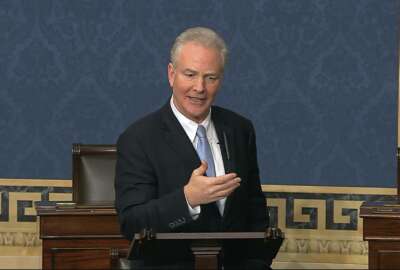
With deadline looming, USCIS employees brace for furloughs
Facing the possibility of furloughs next month, some employees at U.S. Citizenship and Immigration Services are looking for temporary work or a new job altogether.
U.S. Citizenship and Immigration Services is up against the clock as it attempts to secure additional funding to keep the agency afloat for the rest of the year.
Without emergency funding from Congress, USCIS has said it will have no choice but to furlough some 13,400 employees without pay on Aug. 3.
The agency sent furlough notices to its employees late last month and into July.
Reps. Jeff Fortenberry (R-Neb.) and Emanuel Cleaver (D-Mo.) introduced legislation last week, which would give USCIS the $1.2 billion in funding the agency said it needs.
As a fee-for-service agency, USCIS relies on the revenue it collects through work, such as visitor petitions and citizenship applications, to keep the organization running. Because of the pandemic, the agency’s immigration examinations fee collections haven’t met their anticipated projections for the year, USCIS has said.
The House bill would authorize USCIS to include a 10% surcharge on the agency’s application fees, which would allow the agency to eventually “pay back” whatever emergency funding it does receive from Congress.
But time is the big concern.
The Senate will return from recess next week, leaving lawmakers little time to negotiate standalone legislation or include similar language in a broader pandemic stimulus package.
Still, the American Federation of Government Employees, which represents some 14,500 USCIS workers, said it was optimistic Congress would provide the funding necessary to avoid furloughs.
“There are many in Congress, both in the House and Senate and both parties, working very hard to find a solution, and they’re working in good faith to get this done,” Julie Tippens, an AFGE deputy legislative director, told reporters Tuesday. “We’re confident that we can get this done. We’re confident that there is support to do this and stave off the furloughs, and we’re confident that many in Congress understand the potential effects if it’s not done.”
With a reduced workforce, USCIS will process fewer naturalization petitions. Employees won’t be able to conduct as many background or fraud checks on immigrants who have applied for permanent citizenship, said Ruark Hotopp, president of AFGE Local 3928.
USCIS field offices aren’t clear how they’ll continue their work with much of their employees furloughed.
“We are unsure how we’re going to continue our operations if the furlough goes through,” said Nicole Guess, an immigration service officer and president of AFGE Local 2660. “The law tells us that we must interview certain applicants, and we’re not sure how we’re going to continue that.”
Guess’ local represents employees in Kentucky and Indiana. She said some of her colleagues have been working for the USCIS field offices for 30 years or more.
“You have a lot of people who just have a lot of uncertainty,” Guess said. “We don’t know how long this is going to last, so the morale is very low.”
Notices from USCIS indicate employees would be furloughed for a minimum of 30 days and no more than 90 days. At the 90-day mark, the agency will reevaluate and determine whether it’s necessary to send a second round of furlough notices or issue a reduction-in-force (RIF).
“We’ve been assured from the agency that’s not going to happen, but they can do RIFs at that point,” said Danielle Spooner, president of AFGE’s Citizenship and Immigration Services Council.
Congress must approve funding before Aug. 3, the union said. Even if funding comes through on the following day, USCIS employees will still be furloughed for 30 days, Spooner said.
Unlike recent government shutdowns, USCIS employees facing furlough have little concrete reassurance they’ll receive back pay. It would take an act of Congress to grant back pay to furloughed USCIS employees, which AFGE said it will lobby for if necessary.
With the prospect of furloughs weeks away, many USCIS attorneys and others with higher-level degrees are looking for other jobs outside of the agency.
As a veteran with preference, Guess didn’t receive a furlough notice from USCIS. But she said her colleagues are planning to tap into their retirement savings and Thrift Savings Plan to keep themselves afloat while they’re not getting a paycheck.
Others have asked for permission to take on temporary jobs driving for Uber or Door Dash, she added.
Meanwhile, USCIS employees who didn’t receive notices are concerned about the furlough’s impact on the agency’s workload.
“They’re going to have to pick up the pace for everybody who is furloughed,” said Michael Overman, a vice president for AFGE’s CIS Council. Like Guess, he didn’t receive a furlough notice because he too has veterans preference.
“It’s not a pretty picture for anybody, for furloughed employees or non-furloughed employees, and that includes management,” he said.
Copyright © 2025 Federal News Network. All rights reserved. This website is not intended for users located within the European Economic Area.
Nicole Ogrysko is a reporter for Federal News Network focusing on the federal workforce and federal pay and benefits.
Follow @nogryskoWFED
Related Stories





